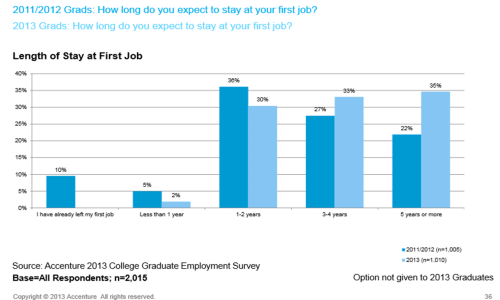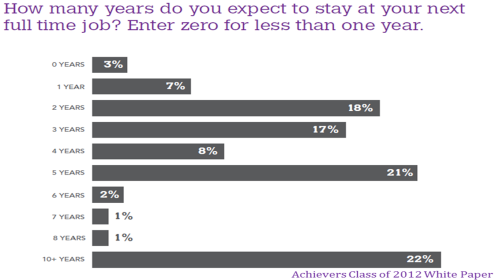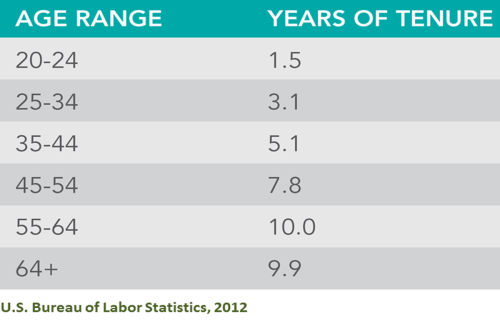
Accenture recently published its 2013 College Graduate Employment Survey Findings. Lots of great data. Especially if you plan to hire recent college grads. In fact, some of the data are surprising.
One of the important takeaways is that employers have unrealistic expectations for the skills of the hires they make out of college. They think these young people should be able to hit the ground running and are surprised and disappointed when they don’t. And to compound the problem, these employers are not investing in training initiatives to get the newly hired up to speed in the short term or effective in the long term. This is all pretty logical. It’s good data and if you plan on hiring entry level employees from the ranks of the newly graduated, you should read this.
But here’s what caught my attention. It’s about the willingness to commit. And it isn’t the first time I’ve seen data like these.
Young people, entering the economy for the first time, want to commit to their employers. It’s not what we expect, I know. We expect these youngsters to be gone in the career equivalent of sixty seconds. And sometimes they are. But it’s important to know that that isn’t what they want! This isn’t what they expect!
From Accenture: The class of 2013 is expecting more career longevity from their first jobs: 68% of pending 2013 college grads expect to be at their first job more than 3 years compared to 49% of 2011/2012 college grads.
And from the Achievers Class of 2012 white paper:
In this survey, more than 70% of 2012 college graduates expected to be with their first/next employer 3 years or longer — and 48% expected to be with their first/next employer 5 years or more. Surprising, right? Not what we expect, right? Not what we “know” about Gen Y, right?
But the BLS shows us what happens once they join our organizations:
So, young people entering the economy for the first time with a newly minted degree are filled with optimism and have every intention of committing to their first employer for 5 years or more. Is it naivte or is it a real desire to commit, belong and make a difference?
And what happens once they start that first job that impels them out the door in 18 months or less? Are employers so inept at selection that they really can’t hire employees that will persist? Are young people so naïve that they don’t really know what they’re signing up for and leave when reality doesn’t match expectations? Or, as the Accenture survey suggests, are young people disappointed when expected training and development doesn’t materialize and they leave in search of greater learning opportunities?
Clearly this is a complex issue with lots of dynamics, as the Accenture survey results show. However, if we started with the belief and understanding that young people really do want to engage and commit to their employer, would we be more likely to invest in developing their skills?
If we started with the belief and understanding that young people really do want to engage and commit to their employer, would we create onboarding processes that ensure expectations – on both sides – are being understood and met?
If we started with the belief and understanding that young people really do want to engage and commit to their employer, how would we approach them differently?
I suspect that most employers believe that there’s no return in investing in a talent pool that will be gone in 60 seconds.
I further suspect that the EVP that is sold in the recruiting process doesn’t exactly come to life once the recruit joins the organization.
But I suspect that the real issue is that Gen X and Baby Boomer managers, supervisors and recruiters believe all the negative stereotypes about Gen Y and their lack of commitment to any agendas other than their own — despite multiple data sources that show just the opposite. And we’ve ended up in this tough reality that has become a full-fledged self-fulfilling prophecy.








Pingback: 5 Top Blogs of the Week - Workology
Sharing an article – http://tr.im/42lyz
Pingback: Onboarding: Not Rocket Science |
Pingback: Gen Y's Self-fulfilling Prophecy | Gen Y at wor...
Reblogged this on Corporate Sensemaker and commented:
Is long-term employment kicking back? There’s a lot about values and the need fro rethinking the HR function in this post. I believe it is so related to my recent post on the HRPS global conference
Pingback: 5 Top Blogs of the Week HR, Recruiting, Social Media Policies, Human Resources, HR Technology Blogging4Jobs
Very interesting research! I agree that the main takeaway is to not assume anything. When bringing a new employee on board, treat them like they want to be with the company for a while. Give them the tools to succeed, at any level.
Pingback: Gen Y's Self-fulfilling Prophecy | People Reall...
Pingback: Gen Y's Self-fulfilling Prophecy | The Millenni...
Much of this data could be used to throw gasoline on the flames of generational stereotypes and reinforce them, but I prefer to see two important take-aways.
1. Employers: New employees do not enter the organization with some sort of natural instinct about the culture or the details of how to apply their education in real life. If you don’t show them you will lose them and your investment is wasted.
2. New graduates: You have a right to expect to be taken seriously and mentored into a successful career. If you are not assigned a mentor, adopt one on your own. You don’t know it all yet, but you do bring a unique perspective and valuable insight to the table.
Just as many companies fail to consider the candidate experience when recruiting new employees, many also forget that the employee experience begins on hire and it will have a long lasting effects on the culture and success of the company. These facts really are not generational, but are more obvious when there is already a bias alive in the workplace.
Much of that willingness to commit may be the lag effect of the weak economy. Perhaps seeing many of their older peers struggle to find work, many would rather stick with an organization than battle it out on the job market.